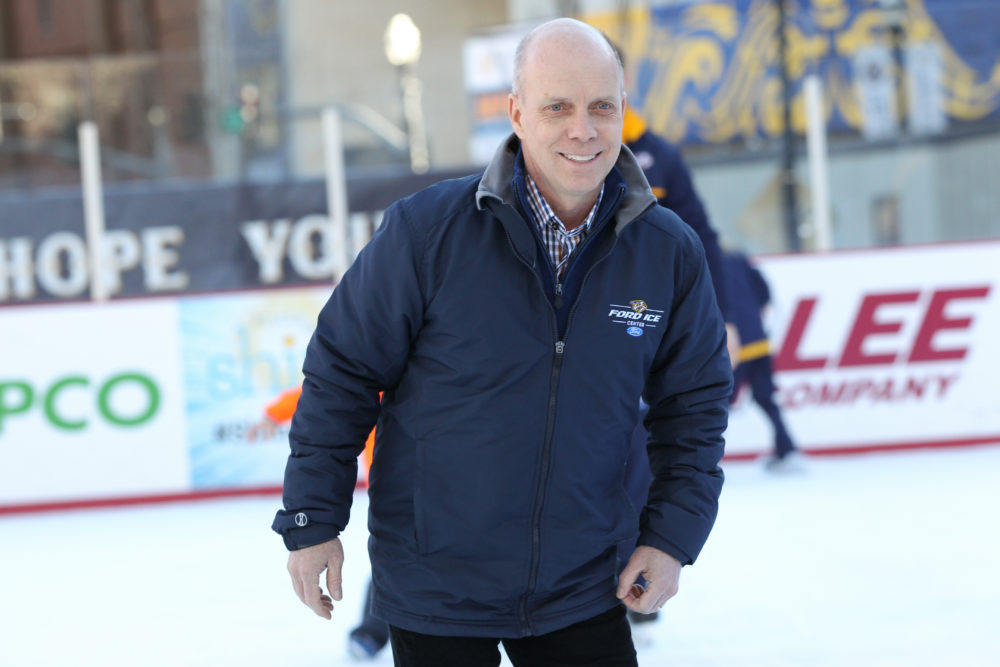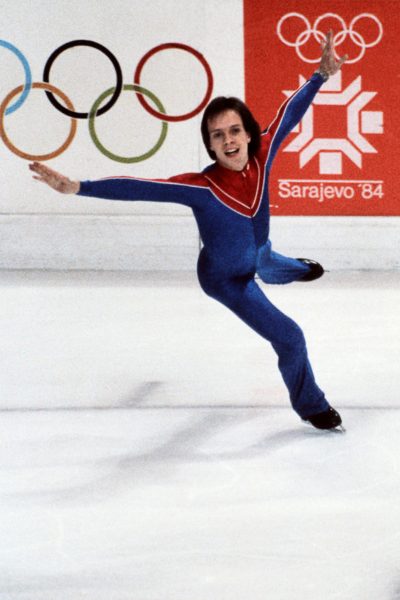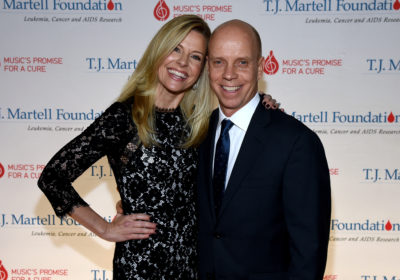Advertisement
How Skating Helped Save Scott Hamilton

Reporter Alice Cook has known Scott Hamilton since they were kids. They're both from the Midwest. They both grew up in ice rinks. And they were both Olympians. Scott has an Olympic gold medal. Alice says she was just happy to make the team.
When I ask Scott Hamilton to introduce himself, there's no mention of his Olympic glory. As usual, Scott is his humble, self-deprecating self.
"Tell me who you are and what you do," I ask.
"That's complicated!" Scott says with a laugh. "I know who I am. My name is Scott Scovell Hamilton. And, well, I did skating for a long time. And now I'm doing a lot more volunteer work and cancer fundraising. I have a skating academy. And I've got four kids, so I'm a dad. So that's what I do."
"That's a lot."
"It's more than enough."
Growing Up In Hospitals
Figure skaters tend to be physically smaller than most Winter Olympic athletes. Scott was especially small when he laced up his first pair of skates.
"When and how did your parents realize something might be wrong?" I ask.
"I was always small," Scott says. "But it became obvious that I wasn't growing very well. And then it became obvious that I wasn't growing at all. And then it became obvious that I was showing some signs of stress. And so for about four years, I was in and out of hospitals, and they couldn't come up with a diagnosis."
Scott wasn’t growing. Food didn’t help. So his doctors turned to something unconventional.
"My supplement back then — and they didn't know what they were doing; they were just trying to keep me alive — was this liquid that was just really nutritious. But it actually tasted like chalk, and I hated it," Scott says. "And so pretty soon, I became sort of a pathological liar and very manipulative. And I would say that I was going to drink it in the bathroom, and I would dump it out every single time. And once I got caught — my mom caught me dumping it out — and I basically told her I wasn't going to drink it anymore, because it was awful. And we came up with a compromise of putting a tube up through my nose, down my esophagus, and I was fed through the nose tube. So I never had to taste that junk again.
"And it was the perfect compromise. The best compromise. So I always knew that I was different than all the other kids just because of my height and my, you know — just sort of the way that I grew up mostly in hospitals."
Advertisement
After seeking the opinion of a number of doctors, Scott saw a specialist at Boston Children’s Hospital.
"He just said, 'I can't diagnose this,' " Scott says. "He said, 'Go home.' He just said, 'Go home. Take him off all the restrictive diets. Keep him on the supplement and live a normal life.' "
Scott wouldn’t get a real diagnosis until several decades later, after more major health scares.
Finding The Ice
But with the doctor's advice in hand, Scott’s mom and dad took their 9-year-old son to the brand new ice facility at Bowling Green State University.
"I walk in, and everybody’s looking at this nose tube coming out, and they’re just looking at me like, 'Gross,' " Scott recalls. "It’s like, 'Well, this is me. What can I say?' "
"So what was it like skating for the first time?" I ask.
"Well, it's like for everybody else, right? You get into some rental skates, and they don't fit right. They don't feel good," Scott says. "They're wobbly and, you know, you're hanging onto the wall. And then after a while, you know, you're able to get around without touching the wall, and then pretty soon you're able to get around pretty good.
"And I realized, in that process of getting better, that I found something I could do as well as the well kids. And then I found I could do something as well as the best athletes in my grade. And it was really powerful, because it was the first-ever taste of self-esteem. I never felt good about myself until that."
Scott would later come to believe skating saved his life. At this point he was just a kid having fun on the ice.
"But it was one of those things where I started to grow, and I started to develop again and I started getting better," Scott says. "And so my parents were, 'OK, we found something that works. By accident, mind you, but we found something that works, and we're just going to stick with this.' ”
'She Sacrificed Everything'
The expense of figure skating put a drain on the family’s finances. But Scott’s mother found a way to pay for the coaching, the skates and the ice time.
"She was a strong lady," Scott says. "She was five-foot-and-a-quarter, as she would tell people — you know, it's like when you're that small, you want to, like, add every quarter of an inch, right?"
"I get that," I say.
"Oh, man," Scott says. "She sacrificed everything for me and my brother and sister. She never really bought herself any clothes. She was the person, um, on this world that I loved more than any other. And I just adored her."
Scott was just a teenager when his mother was diagnosed with breast cancer.

"You know, her chemotherapy descriptions were hilarious," Scott says. "You know, she'd say, 'Oh, this chemotherapy is wonderful. I finally found a way to lose all this weight.' 'Oh, I like chemotherapy. I've been wanting to quit smoking all these years and now I have no desire.' And she said, 'Oh, I love chemo. I've always hated my hair. These wigs are so much easier.' So she always made it OK.
Dorothy Hamilton passed away in 1977.
"And when you’re 18 years old, you don’t have anything to compare this life event to, and it’s devastating, you know?" Scott says. "So I kind of had to go for a walk in my backyard. And in that walk, I kind of came to, you know, sort of a game plan of taking her with me wherever I went.
"She always wanted me to be a really good skater, and she always thought, you know, someday I'd go to the Olympics and all that junk. And it’s like, yeah, really? Based on what? My last last-place finish? The last competition she saw me skate in, I was an epic disaster, and I came in 9th at Nationals.
After that I just had to get to work. And if I didn’t feel like showing up for a session, I did because I wanted to honor her."
'She Was Really The Main Reason It Happened'
Scott moved to Denver, Colorado to train with renowned coach Don Laws and found a sponsor to take care of everything from training expenses to his housing. His skating took off from there.
Scott was chosen to carry the flag for Team USA at the 1980 Olympic Opening Ceremony in Lake Placid, New York. He finished fifth.
"And then about, I guess a month later, the top three guys all retired," Scott says. "So all of a sudden, I was ranked second in the world. So for the next four years I never really lost. Well, I never lost."
Scott Hamilton won three consecutive world championships. In 1984, he took home an Olympic Gold medal. Nobody could stop him.
"And standing on the Olympic podium after four years of really just winning every competition, it was kind of like, 'What in the world just happened?' " Scott remembers. "And you feel really good that a dream that you never thought to dream has come true. And, you know, I just — I felt bad that my mom wasn't there to see it, but she was really the main reason that it happened."
An Extraordinary Gift
Scott returned home to a hero's welcome in Denver. After a ticker tape parade, with a freshly-minted gold medal around his neck, Scott was invited to a private meeting with Gov. Richard Lamm.
"You know, usually with politicians it's a photo op, and it's this and it's that. And when I arrived in his office, it was just he and me," Scott says. "And I thought, 'This is really weird. I don't know what to make of this.' And he said, 'I just really wanted to talk to you and give you some advice.' And he said, 'There's this thing called the "hometown hero syndrome". And, basically, you can look at it as if, like, let's say you're the quarterback for the high school football team, and you throw a bomb to win the state championship at the end of the game. And they carry you off the field on their shoulders — you kind of feel like the rest of your life should be that way, right?' And I'm picturing all this, and he goes, 'You just lived through an extraordinary period of your life. But I really want you to enjoy every moment with the true understanding that your life isn't always going to be this way.'
"And in that moment, I realized that he was giving me an extraordinary gift. It's, like, really? Somebody thinks enough of another human being to, kind of, almost arm them for, kind of, the inevitability of 'next', right?"
Scott went on to create “Stars on Ice,” a tour that brought together the best skaters in the world, performing for huge audiences in major cities. It became an amazingly successful business venture. Scott was the star and also the boss. But he wasn’t very happy. He felt stressed all the time.
"And I realized that life was out of balance," Scott says. "And I had such bad abdominal pain that, 50 cities into a 60-city tour, I went into an emergency room in Peoria, Illinois, because it was about a block from the hotel just to get, you know, some ulcer medicine or whatever was going on. I never thought of anything besides stress-related symptoms.
"And the doctor just said, 'There's a mass.' And I kinda chuckled in the beginning. He goes, 'What's so funny?' And I just said, 'Well, you know, honestly, nobody's ever used the word "mass" in description of me before.' And he said, 'No, no, no. You need to take this thing seriously.' And I was like, 'Why?' And I just realized it was like 20 years — almost to the month — that I lost my mom to cancer and now I'm being diagnosed with cancer."
Channeling His Mom
At 38 years old, Scott started his treatment for testicular cancer at the Cleveland Clinic. He went through months of chemotherapy. He says sometimes he’d look in the mirror and hate what he saw. But he took on his cancer battle with the kind of attitude he learned from his mother.
"You know, she always found a way to make something difficult OK," Scott says. "And in that, she armed me with that same thing. I was able to create an environment of levity. My nurse basically treated me like an 8-year-old. You know, I had, like, Scooby-Doo and SpongeBob Band-Aids. And she decorated my chemo bags and she treated me like a pediatric patient, and it was really fun."

Scott got healthy and returned to life on the the ice and the broadcast booth. He got married and became a father. Life was good until the fall of 2004.
"I was symptomatic. So they did some blood work and they found that I had, like, trace amounts of testosterone in my bloodstream," Scott says. "And it was like, 'Well, you know, it's probably an aftereffect of your chemo and your cancer.' It's like, 'Nope, I don't think that's it.' And they're like, 'Well, you know, you're older now.' I go, 'Nope, I don't think that's it.' So I finally described my symptoms enough in detail where they put me in for a head scan and I was diagnosed with a brain tumor.
"I knew I was going to be dealing with this thing immediately, if not sooner. But my wife was arriving that day. And so I went back to the hotel, and they were just pulling up to the front of the hotel, and she goes, 'What did they say?' And I go, 'I'll tell you up in the room.' And so we — kind of an awkward, sort of quiet ride in the elevator, you know, and then up into the room. And she goes, 'What's going on?' And, I mean, how do you tell your wife that, you know, you're up against it again? Right? And I just said, 'I have a brain tumor.'
"Without even, like, one beat passing, she just grabbed both of my hands and she started to pray. And it was the single most powerful moment in my life because I felt the calm. I felt the power of that moment. I felt the clarity of that moment. It just was this awakening, a different kind of awakening, where now I knew I was going to be OK. No matter what, I knew I was going to be OK."
Getting An Answer
Scott was ready to tackle the brain tumor, but first doctors had to take a biopsy.
"Which is digging a hole in the top of my skull and taking a biopsy needle through my brain, where a lot of really super bad things could have happened," he says. "And I remember they told me I could lose speech, memory, motor function, blah, blah, blah, you know, due to this procedure. I woke up at 10:20. I knew who I was, where I was, why I was there. And then I just sort of, like, leaned over a little bit and I went, 'Test.' Like, 'Oh, I can speak! OK, I guess the surgery went OK.'
"And then the doctor came in smiling, and my wife, Tracie, came in smiling, and they go, 'Well, we know what it is.' And I go, 'What is it?' And they go, 'It's a craniopharyngioma.' It's like, 'What's a "lunatic fringoma"? I have no idea what you're talking about.'
"So they gave my wife some literature on the brain tumor, and she read it. And she said, 'Oh, wow, listen to this: "Craniopharyngiomas are brain tumors a child is born with that usually show themselves due to a lack of growth and development." ' And I was like, 'Whoa, that is crazy.' So it's like I joke now: I guess if you live long enough, all questions will be answered. And so that was my childhood illness."
Scott says he’s grateful that doctors didn’t discover the tumor when he was a kid — he says if he’d gotten a craniotomy 50 years ago, his life would’ve looked very different.
In 2010, Scott had a second brain surgery to prevent the recurrence of the benign tumor. In 2016 he learned it had returned.
"The doctors are giving me all the different scenarios," Scott recalls. " 'We could do surgery again, we could do — there's a medical thing that will shrink it and keep it at bay. Here are the side effects and blah, blah, you know, blah, blah, blah, blah.' And all I felt — and it was almost like a voice in my head said, 'Get strong.' And I was like, OK, I don't know what this means. I don't know what's going on, but I know I'm supposed to get strong.
"And the doctor said, 'So how would you like to proceed?' And I say, 'I don't. You know, since you caught this thing on a general scan without symptoms, we're just going to keep an eye on it. My gut says keep an eye on it.' "
'Badges Of Honor'
Instead of surgery, Scott decided to make some dietary and lifestyle changes. He gave up red meat and sugar.
"And I went back a few months later for another scan and it hadn't grown," Scott says. "And that was the best news that they could possibly give me until the next scan, where I went back and it shrunk without treatment. And they couldn't figure that out. And then I went back, and it shrunk again. All they said there was, 'Whatever you're doing, keep doing it,' you know?"
Scott now lives in Tennessee with his wife, Tracie, and four children. He stays close to the ice with his skating school and dedicates a lot of his time to fundraising for cancer research.
"Now I look in the mirror and see all the scars from all the different injuries and surgeries and all the other things, and I look at them differently than I thought I would," Scott says. "Normally, you look at scars as, like, disfigurements. And I look like at them as, you know, sort of badges of honor. It's, like, that skin is tougher than it’s ever been. And it will never be hurt the same way it was before."
Scott Hamilton's most recent book is titled "Finish First: Winning Changes Everything."
This segment aired on July 27, 2019.
